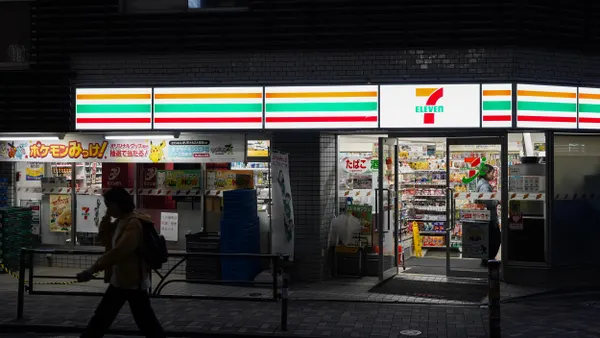Dive Brief:
- A report published last week in the New York Times suggests Subway franchisees are being forced out of business by the company's development agents who are often also franchisees in the same territories.
- The report was corroborated by a number of franchisees, as well as field consultants sent by development agents to deliberately fail targeted restaurants during inspections for infractions as minor as a hand print on a window. Once forced out of business, the agent often ended up taking over the rival business, according to the article.
- Subway has more than 24,000 stores in the U.S. and relatively low startup costs. Franchisees can open a unit for as low as $15,000, which has made it attractive to independent operators, entrepreneurs and immigrants.
Dive Insight:
This latest news highlights the sandwich chains ongoing financial and franchisee struggles. Subway closed more than 1,000 restaurants in the U.S. last year. Simultaneously, the chain is generating one of the lowest unit volume averages in the industry, at around $400,000, according to Restaurant Business. Competitors like Jimmy John's, Firehouse Subs and Jersey Mike's average unit volumes that are 80% higher.
These are clear signs the system got too big and is likely cannibalizing itself. But, as a private company not beholden to financial disclosures, it's hard to tell what's really going on after a few tumultuous years of business that has also included the arrest of its spokesperson Jared Fogle, significant increased competition in the sandwich category and franchisee pushback on the $5 footlong deal.
The New York Times report illustrates an unflattering picture of how the company may be managing its bloated franchise system. It's hard to argue that development agents operating franchises in the same territories they supervise is not a conflict of interest and many of the franchisees in the story claim to have had profitable stores, making these takeovers even more puzzling.
This story comes on the heels of allegations brought forth in May by a number of franchisees alleging the company was going after them for minor infractions in an attempt to run them out of business and restructure. According to the New York Post, Subway initiated 702 arbitration actions against its franchisees in 2017. Comparatively, McDonald's initiated one while Dunkin' had two that year.
Subway's allegations have also evolved into multiple lawsuits filed against the company and have caught the attention of U.S. Senator Catherine Cortez Masto, which is never a good sign.
Subway is not the only national chain that's been accused of using inspections to try to get a franchisee to sell their restaurants. One of Burger King's largest franchisees sued the fast food giant for what he deemed was "bullying" to try get him to sell some of his Texas locations, for example. Both sides agreed to dismiss the case in April and the restaurants remain open.
Whether or not the allegations against Subway prove to be true is perhaps less important than the fact that there is clearly a disconnect between the franchisor and some franchisees — a major red flag for the health of a brand.
Subway is in the middle of an $80 million plan to improve its menu and customer service. It is also working on updating its customer-facing technologies and store design. It's also planning to provide over 5,000 operators with $10,000 in loans to help cover remodeling costs. None of this work will matter much, however, if the franchisees aren't on the same page or if the lawsuits side with those franchisees.










